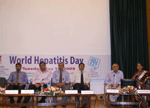
SIUT seminar
A Symposium was held at Sindh Institute of Urology and Transplantation (SIUT) in collaboration with Pakistan Society of Gastroenterology (PSG) to commemorate the World Hepatitis Day. The theme was “Am I number 12?” It was to emphasize that one in 12 people worldwide are living with either chronic hepatitis B or hepatitis C. Many among them are not even aware about it.
Dr. Anwar Naqvi of SIUT inaugurated the session. On the occasion, he emphasized that hepatitis is a global malady affecting millions around the world. More significantly hepatitis is also widely prevalent in Pakistan and its spreading rapidly. It requires concerted effort on war-footing at primary, secondary and tertiary levels by healthcare professionals and the community at large to ensure global prevention and guarantee effective treatment.
Dr. Zaigham Abbas of SIUT and Vice President of PSG, in his welcome remarks, highlighted the importance of the day. While prevalence of hepatitis B and C is far higher than the prevalence of HIV or any cancer, awareness is inexplicably low and the majority of those infected are unaware. He said that about 2.5 % of Pakistani population is suffering from hepatitis B and 5% with hepatitis C. It means that about 12 million people are infected with either of these viruses. There are simple screening blood tests for both hepatitis B and hepatitis C. It is important to know how to avoid transmitting the infection to others and consider the treatment options. Getting immunised is the best way
of preventing hepatitis B infection. There is no vaccine for hepatitis C. Many people do not have any symptoms if they contract hepatitis B or C, although they can still transmit the viruses to others. The most common routes of infection are reuse of syringes and needles, treatment of common ailments by injections and drips, inade-quately screened blood trans-fusions, medical or dental interventions without ade-quate sterilisation of equipment, sharing razors, blades, toothbrushes or other household articles, tattoo-
ing and body piercing if done using unsterilized equipment. In case of hepatitis B, mother to infant transmission during childbirth and sexual transmission is also important.
In the scientific session, Dr. Saad Niaz, General Secretary of PSG pointed out taboos prevailing in the public and misunderstandings in the management ofhepatitis B and C. Dr. Zaigham Abbas of SIUT discussed new management guidelines of hepatitis B.
Dr. Ashfaq Ahmed of Hamdard University talked about present and future therapies of Hepatitis C.
Dr. Nasir Laeeque of Ziauddin University stressed theimportance of preventive aspects and vaccination for hepatitis B. The session was followed by panel discussion. Dr. S. M. Munir of JPMC and Dr. Jamila Esmail (Aga Khan Hospital) also participated in the discussion.
